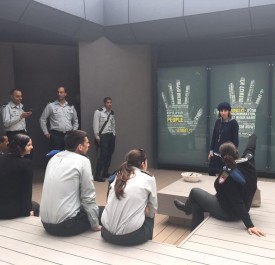


Education in the context of the Holocaust
Multiplicity of Memory
The unique nature of Massuah, as compared with other commemoration establishments and museums lies in the emphasis we place on discussing aspects of Holocaust memory with relevance for contemporary Israeli and international discourse. This approach creates an affinity between historical aspects, issues of culture and memory, and questions of identity that have implications for our present-day life.
Relevant teaching
The Holocaust was a watershed event of the twentieth century. Despite the decades that have elapsed, it is frequently present in both the Israeli discourse and the international discourse. The understanding that the Holocaust is such a substantive part of our being is the central axis around which our work at Massuah revolves. Massuah’s educational approach is grounded on the assumption that exposure to the events of the Holocaust confronts the younger generations with major questions concerning human nature, the Jewish people, the State, culture, and education. In turn, those issues lead to questions relating to personal and collective identity which are particularly relevant to young peoples’ worlds. Our immense challenge is to transform young people’s attitudes from viewing the Holocaust as a historical event, to addressing the Holocaust and how it is remembered as a theme allowing us to examine our lives today, and the relevant significance of discussing the Holocaust for our core values as Israelis, as Jews, and as human beings.
Between memory and history
The seminars we hold at Massuah build a bridge between history and memory by debating questions pertaining to Jewish, Israeli, and human identity. In workshops and activities at the Museum and multimedia centers, we try to clarify not only what happened and how it happened, but also to discuss questions relating to the significance of Holocaust memory. This stems from the understanding that thinking about the choices people made during another era spurs youngsters to consider the complexity of good and evil, the options they can choose as individuals, their responsibility towards themselves and others, and their identity. We do this via an approach encouraging openness, that enables participants to re-examine their positions, and to bring up questions, emphases, and meanings from their own familiar world.
Integrative teaching
Creating historical contexts and proposing suitable perspectives between the historian’s voice and the victims’ voices – in diaries, letters, publications, and testimonies of Holocaust survivors – jointly constitute the key to Massuah’s educational approach.
Massuah’s educational program addresses three spheres: policy and training of the perpetrators of extermination (from propaganda to terror), surrounding society (the bystanders, the collaborators, and those who risked their lives by saving the persecuted); and of course a meaningful discussion of the victims’ worlds and their different response patterns during the days of horror.
Personification
As early as the 1980s, we replaced the discourse of vast numbers and generalizations with the personification of human dilemmas that people had to cope with. At the heart of the program we positioned countless personal accounts illustrating the multiple aspects of personal and human coping by Jews during the Holocaust. Those personal stories form the foundation both for generating empathy and for a more nuanced understanding of the lives of women, men and teenagers as individuals, families, and groups trapped in hell. This approach helps stimulate pupils into thinking about what they knew, how they grasped events, what were the options facing them, what their decision-making process was, and which moral dilemmas they confronted.
Experiential value-based multidisciplinary teaching
The Massuah Institute develops multimedia systems, displays, and workshops applying a multidisciplinary approach which draws on the humanities, social sciences, and culture. The Institute mediates between historical research which is a sphere limited to scholars, and the charged subject of Holocaust education. This is effected via a range of disciplines that allow significant experiential learning within a short timeframe. The exhibits at Massuah challenge visitors to think about the connection between information and the presented facts (what, when, where, and so forth) and their own world; they encourage reflection about emotional aspects and about central questions of values; and they encourage them to consider their private and collective identity in universal and national contexts.
Methodology – significant and interpretive learning
Activities at Massuah are based on developing new facilitation models, with a focus on experiential learning and discussions that address values. The study spaces within the display areas in the Massuah Museum enable a mutual learning experience with other members of the group, providing room for a broad spectrum of participants’ interpretations of their visit to the museum and the multimedia centers.
Between Israeli and Jewish identity
The themes of exhibitions at Massuah are chosen to accord with the Institute’s educational approach and emphases. The central exhibition in the Massuah Museum highlights the Eichmann Trial, an event that for many years shaped Israeli society’s awareness to the Holocaust. It was the Eichmann Trial that renewed the connection between the Israeli-Hebrew identity and the Israeli-Jewish identity – repressed for decades by the national leadership. For the first time, the Jewish world from which the survivors came received legitimacy. After dozens of years of ‘negating the exile’ Israeli society now started showing empathy to the Jewish world from which the survivors had come. With the influence of the Trial, attitudes towards the survivors also changed, and a continuing process blurred the rigid distinction between Israeli identity and Jewish identity. As part of that process, the status of the Holocaust in Israeli memory underwent change, and now began to obtain a central position in Israeli discourse.
Holocaust education – in a generation without witnesses
In the second decade of the twenty-first century, we are facing a major and profound change in the realm of Holocaust memory. We will not be able in future to rely on the personal memories of people who lived through that period – memories that for decades were central elements in shaping Holocaust memory in the State of Israel.
The development of information technology and technological exhibits allows us to illustrate to visitors scenes of the Holocaust in the first person singular, chiefly through the educational challenge of transmitting survivors’ voices to future generations which underlay the development of the media infrastructure and the multimedia centers as an integral part of the six permanent exhibitions at the Massuah Museum. The Massuah archive holds a valuable collection of recorded testimonies by Holocaust survivors. The central exhibition at the Museum ‘Six Million Prosecutors – The State of Israel against Adolf Eichmann’ deals with the Holocaust as depicted by the testimonies of 101 survivors during the trial in Jerusalem. A multimedia system in the exhibition lets visitors explore the survivors’ accounts, and observe the different viewpoints of witnesses to the events.
Between documentation and testimony – and artistic representation
For young Israelis in the Third Millennium, shaping Holocaust memory takes place primarily in the media arena, in an atmosphere of multiple narratives. Our challenge at Massuah is to explore that memory and the change that has taken place in Israeli society’s attitude to survivors. We do so via the cultural discourse in Israel as reflected in original works in the arts and various kinds of media. The displays focusing on the significance of memory are by definition intended to spark the visitors to think. Analyzing works from a historical perspective lets us create an experience that triggers participants into considering how Holocaust memory impacts on our understandings about our world and its values.
As we move further away from the events of the Holocaust, it is paradoxically gaining a stronger presence in Israel’s cultural and public discourse. Even though the exhibitions and workshops at the Massuah Museum address historical events, they reflect that presence and allow an examination of the Holocaust’s impact on Israel’s collective memory, on the assumption that memory is dynamic and changes under the influence of topics on today’s public agenda.
Aya Ben Naftaly, Director-General of Massuah
January 2018

Meaningful learning for senior-high students at Massuah

Delegations to Poland

meaningful learning for junior High schools at Massuah

Educational activities for religious schools
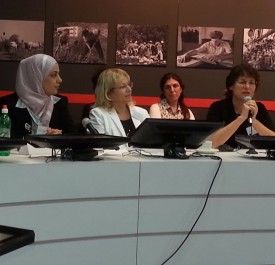
Massuah's Holocaust Education college
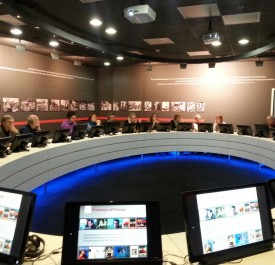
Training courses for teachers
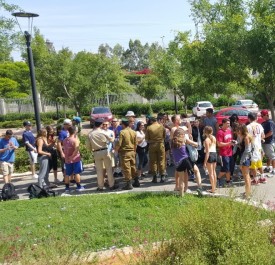
Educational activity for overseas groups
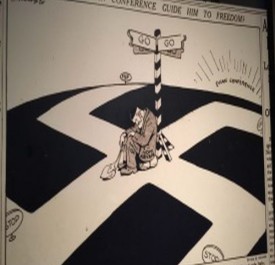
Sources of instruction
